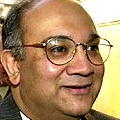 |  |
|
The Standards Board for England, the local government police service, has proclaimed a local councillor guilty of trying to make himself happy. Or unhappy. And so it sentenced him to be suspended from office for one year. Context The Danegate development in Macclesfield offered to provide industry, jobs and improvements to inadequate sports facilities. M. supported the plan until he found out that it wasn't going to deliver the promised benefits. Danegate foundered on planning grounds in November 2001 but one of the disappointed potential beneficiaries was persuaded to complain about M.'s role in the final planning meeting to the Local Government Ombudsman, who ruled that there had been no injustice. All the council could do with the report was 'note' it. The council could neither change the content nor refuse to accept the report.M. was told he should not comment on the Ombudsman's report during the debate because he might have a personal and prejudicial interest in it. If he spoke, he risked breaching the council's Code of Conduct. M. asked the council's chief executive for clarification. All he received was confusion: on the one hand this - on the other hand that and, as the bottom line: "It's up to you yourself to decide if you have an interest." In the light of such clear-cut advice, M. concluded he did not have an 'interest' (in the sense of personal benefit) to declare and he asssumed that it would be okay to exercise his natural right to defend/explain himself. As part of an on-going political vendetta led by council leader Peter Burns, M. was 'shopped' to the Standards Board for England for conduct unbecoming a councillor. The Tribunal's Ruling The Tribunal found that M. had a personal interest in the debate on the Ombudsman's report and he should not have addressed the meeting. This 'personal interest' was not financial and there was no suggestion that he stood to make any personal gain or advantage. As M. explained to the Tribunal, he was just trying to look after the interests of Macclefield’s local taxpayers when the council’s leaders seemed to be following a different agenda. But the tribunal ruled that the state of his personal happiness or unhappiness was at stake and that was why he should not have taken part in the debate. Curiously, the degree of happiness/unhappiness experienced by a group of Tory councillors who had been waging a vendetta against M. for four years was not called into question. Nobody in officialdom cared about the happiness of the leader of that clique (and then leader of the council) Peter Burns. Only M.’s personal happiness or unhappiness has ever been a matter of consequence.The Tribunal also said that M.'s integrity had been brought into question. Which is strange as most Macclesfield councillors, including Lib-Dem and Labour opponents, agree that M.’s integrity has never ever been in question and he found himself up before the Tribunal entirely as a consequence of a political vendetta waged by Burns and his buddies. Mechanics of the System A Standards Board Tribunal makes judgements based on ‘what the man in the street would think if he were in full possession of the facts’. Fine and dandy – except that the Standards Board is highly selective in its ‘evidence’ gathering, it does not allow its ‘investigators’ to be questioned as to the accuracy or completeness of their ‘evidence’ and it objects when ‘the accused’ wants to call witnesses in his/her defence.
The Verdict The outcome of the Tribunal was a travesty of natural justice. The Tribunal ruled that because he was identified in the Ombudsman's report, the outcome of the debate would affect M.’s state of personal happiness or unhappiness – which amounted to a personal interest. It apparently ignored the fact that the report had received full coverage in the local paper some weeks before and that it was no longer a ‘live issue’. The Danegate Three – Companions In Exile? As M. heads into undefined political exile for a year (the Standards Board was unable to explain to him exactly what his suspension means in practice when he asked after receiving his sentence), his opponents in the Danegate affair were not destined to remain in place to gloat. Cllr. Burns, the leader of the council, crashed and burned right away – a couple of weeks before he was due to appear in court on charges of threatening behaviour in a local hospital's Accident & Emergency Depapartment and, according to the local paper, a charge of dangerous driving. Four further allegations of physical violence and intimidation have not, as yet, led to court proceedings. M. told his Tribunal that he felt he had a right to defend himself under the terms of the European Convention on Human Rights and he also had a right to receive the full advice obtained by the council's officers. As a parting shot, the Tribunal recommended that Macclesfield Council examine its procedures on these issues. Stooge or Snake-In-The-Grass?
Political Criminals and their Punishment
M. was suspended from active membership of Macclesfield Borough Council for 1 year for addressing the council on an issue which, it was ruled, could have affected the state of his personal happiness or unhappiness. Here are examples of the sort of penalties applied to Members of Parliament, and others, for much more serious acts of political misconduct.
Sheffield Attercliffe Labour MP Clive Betts was banned from the Commons for 7 days over his part in a bogus immigration bid by a former male escort who worked as his assistant
Conservative MP Michael Trend was suspended from the House of Commons for 2 weeks after he wrongly claimed more than £90,000 worth of expenses
Former Europe minister Labour MP Keith Vaz was banned from the House of Commons for 1 month after a conviction by the Commons standards and privileges committee for 'a contempt' of the Commons and serious breaches of the MPs' code of conduct. Mr Vaz was found to have given 'misleading information' about his financial links to the Hinduja brothers, whose passport applications caused Peter Mandelson to resign from government. Mr Vaz said at the time that the punishment, one of the toughest ever handed down to an MP, was 'disproportionate' to his alleged misdemeanours and against natural justice.
Former paymaster general Labour MP Geoffrey Robinson was suspended from the House of Commons for 3 weeks for failing to register a contract that he entered into in 1990 involving a £200,000 payment from a company belonging to former Labour MP and all-round criminal Robert Maxwell.
Conservative MP Teresa Gorman was suspended from the House of Commons for 1 month for failure to register two properties in Portugal rented out to tenants, giving "seriously misleading" information about her connections with some offshore companies; introducing a Bill to change the Rent Act without registering and declaring her financial interest; and giving misleading information about her interests in offshore companies.
Labour MP Don Touhig was suspended from the Commons for 3 days over the leak of a select committee report on child benefit.
Labour MP Ernie Ross was suspended from the Commons for 2 weeks without pay for leaking a Foreign Affairs Select Committee report to the Foreign Secretary Robin Cook.
Labour MP Fiona Jones was disqualified from parliament after being convicted in the courts of falsely declaring expenses for the 1997 general election. She won an appeal against sentence on the grounds that the rules on election expenses were unclear and the High Court in London ruled that she could take up her seat again in April 1999.
Labour MP Ronnie Campbell was ordered out of the House of Commons for the rest of the day for calling the Conservative Shadow Agriculture Minister, Michael Jack, a 'hypocrite'.
In Israel, Prime Minister Ariel Sharon was cleared of corruption charges. He accepted a bung of £300,000 for using his influence in a deal involving a development on a Greek island and his son was put in charge of marketing the project even though he had no experience of the job. But Israel's new attorney general reached the Huttonesque conclusion that there was no question of corruption because, wait for it: the Sharons are too dim to know when they are being bribed!
Conservative MP Jonathan Sayeed is looking at suspension from the Commons for 2 weeks for hosting Parliamentary lunches and tours of American tourists on behalf of a company in which he had a 30% stake, although there was no evidence of direct payments. He was convicted because his conduct 'fell well below the standards the House expects and risked damage to its reputation'.
Labour councillors Muhammad Afzal, Mohammed Islam, Mohammed Kazi (of Aston, Birmingham), Shafaq Ahmed, Shah Jahan and Ayaz Khan (of Bordesley Green, Birmingham) were all convicted of rigging postal votes in the 2004 council elections. They were all stripped of office and banned from standing again as candidates.
London's mayor Ken Livingstone was suspended from his office, with full pay, for 4 weeks for being rude to a Jewish journalist. Anyone still think M.'s treatment by the Standards Board (over a nothing offence with only emotional 'wellbeing' at stake) was remotely fair? | |||||
|


 The only winner of the affair appears to be Cllr. George Marshall, deputy leader of Macclesfield council, who will now carry out the responsibilities of the leader for the rest of the municipal year. There is a certain feeling that the ousted Peter Burns was led astray by his supporters, who knuckled under to his slightest whim. If they had stood up to him occasionally, it is felt, he would not have been encouraged to his political (and physical) excesses and he might have slipped into retirement with his reputation somewhat less tarnished.
The only winner of the affair appears to be Cllr. George Marshall, deputy leader of Macclesfield council, who will now carry out the responsibilities of the leader for the rest of the municipal year. There is a certain feeling that the ousted Peter Burns was led astray by his supporters, who knuckled under to his slightest whim. If they had stood up to him occasionally, it is felt, he would not have been encouraged to his political (and physical) excesses and he might have slipped into retirement with his reputation somewhat less tarnished. Macclesfield's Tories have elected a new leader. Despite receiving a ringing 'deathbed' endorsement from former leader Peter Burns (in which Burns described himself as an 'ex-president' and showered himself with praise), the former bag-carrier soon found himself at the heart of an Anyone but Marshall for Leader campaign. So he is now on the sidelines with the Danegate Three.
Macclesfield's Tories have elected a new leader. Despite receiving a ringing 'deathbed' endorsement from former leader Peter Burns (in which Burns described himself as an 'ex-president' and showered himself with praise), the former bag-carrier soon found himself at the heart of an Anyone but Marshall for Leader campaign. So he is now on the sidelines with the Danegate Three. Cllr. Sue Kippling, who has been described as a former hockey-stick mistress, has now taken control of Macclesfield's squabbling Tories, and she immediately piled her desktop high with goodies for her favoured chums. Everyone who counts is on the payroll as the chairman of one committee or another.
Cllr. Sue Kippling, who has been described as a former hockey-stick mistress, has now taken control of Macclesfield's squabbling Tories, and she immediately piled her desktop high with goodies for her favoured chums. Everyone who counts is on the payroll as the chairman of one committee or another. May 2004
May 2004
 September, 2003
September, 2003
 February, 2003
February, 2003
 February, 2002
February, 2002
 October, 2001
October, 2001
 March, 2000
March, 2000
 October, 1999
October, 1999
 Labour MP Kali Mountford, former member of the Social Security Committee, was suspended from the Commons for
Labour MP Kali Mountford, former member of the Social Security Committee, was suspended from the Commons for  July, 1999
July, 1999
 April, 1999
April, 1999
 March 1998
March 1998
 February, 2006
February, 2006



